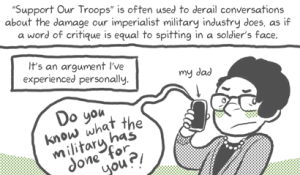
Caption: Time Inc
I still remember the feeling of anxiety that came along with the excitement of being part of the in-crowd. The first few weeks of school are always a little stressful with me wanting to make sure I had friends and wasn’t an outcast.
And each year, I successfully landed a spot in a nice group of girls that I had a lot of fun with. We had sleepovers, movies, lunch dates, and pedicure parties.
While all of these girls were nice on their own, something would happen when we all got together.
We talked…and we talked about other girls…we said mean things about them behind their backs. And it strangely brought us closer together and made us feel united.
The trouble was that what united us was the exclusion of someone else.
I remember hearing things and even on occasion saying things like: “I love her to death but I can’t stand when she…”, “If I said this to her, she wouldn’t listen or change”, or the classic “Don’t say anything to her but…”.
Those phrases made my stomach turn and my goose bumps rise to attention.
Why did I gossip behind other people’s back? If I felt angry, upset or jealous towards someone, why didn’t I just talk to them about it?
Or even if I wasn’t saying anything, why didn’t I stop it? Why did I nod along and neutrally agree with things I completely disagreed with and angered me?
Thankfully, I talked to my mom about it and she said something to me once that shifted my perspective and made me change my ways. (I’m not going to pretend I became some anti-bullying super hero. I still have moments of weakness where I resort to cattiness or don’t interfere when gossip is occurring.)
My mom said, “If they’re saying this about ‘Jenny’, who knows what they’re saying about you when you’re not there”. Looking back, I’m a little disappointed it took a “take a walk in her shoes” pep talk from my mom for me to grow a backbone, but hey, I am what I am.
Why Gossip Is a Form of Bullying
Gossip is a form of emotional and verbal bullying that many people minimize.
While you may not be pushing someone into a locker or stealing their milk money, it’s extremely hurtful to the target’s self esteem, mental health, and friendships.
Gossip deals with topics that are shocking, personal, intimate, and often embarrassing. Gossip is often untrue, exaggerated, and discussed without the target being aware.
Whether you’re the one doing the bad mouthing, the one nodding along in agreement, or the one with their stomach turning, there are a few things we should recognize that this does to our friendships:
1) If we’re gossiping, we are always indirectly hurting someone’s reputation, self-esteem, friendships, and credibility.
2) We train ourselves to avoid confrontations and this not only hurts the victim of our gossip session but also hurts us. Down the road in a work place, keeping things bottled up and venting to the person not responsible for making us upset is viewed as unprofessional and immature.
3) If the person you’re gossiping about did something wrong, we owe them the courtesy of approaching them to give them the benefit of the doubt. Maybe they didn’t know that what they did was wrong and if given the chance, they may change their behaviour.
4) If the person you’re gossiping about is someone you’re jealous of or judgemental of, then maybe we have to do some “me-time” to try to understand why it is we need to criticize others to make us feel more confident.
5) Gossiping as a form of bonding stops us from talking about things that matter like our lives, health, family problems, career goals, and ideas.
Long story short – gossiping is hurtful to everyone. There’s no doubt that speaking out and disagreeing with the crowd can be tricky, uncomfortable, and not always successful.
But in either biting your tongue when tempted to share some gossip or nipping a hurtful conversation in the bud, you are stopping bullying.
And that’s important.
How To Speak Out Against Gossiping
Here are a few tips and examples for how to intervene in a conversation that seems like it’s taking a turn for the worst into gossip-town:
1) Bring the targeted person’s perspective into the conversation to breaks the ‘us versus them’ mentality and remind everyone that they are people too: Really? Jenny’s always been nice to me, I’ve never noticed that about her.
2) Kindly challenge the gossip sharer to be brave and assertive: Have you tried talking about it with her? I think she’d be responsive and totally get where you’re coming from.
3) Name the situation as unfair to make the people gossiping really think about what they’re saying: Jenny’s not here to defend herself guys. This conversation isn’t really fair.
4) Address that gossiping is beneath us: Guys, all we ever do is talk about other people. We’re smart, kind, funny people! I’m sure we can come up with something better to talk about.
Now, I too am responsible for taking my own advice. I am imperfect and just today caught myself talking about someone behind their back instead of bravely confronting the issue in a mature way.
I invite you to take a stance against gossip, a very serious verbal form of bullying, whether that means speaking up or not engaging in it.
Diana Bosnjak is a guest writer for Everyday Feminism. She completed her Masters in Women and Gender Studies and Transnational and Diasporic Studies at the University of Toronto. In her free time she enjoys dancing ungracefully, spending time with her four sisters and trying new foods!
Search our 3000+ articles!
Read our articles about:
Our online racial justice training
Used by hundreds of universities, non-profits, and businesses.
Click to learn more




















